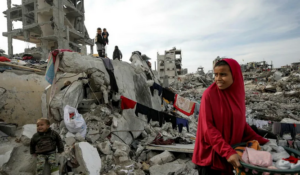The mechanism shielding Israeli soldiers from moral dilemmas

Children in Gaza’s Jabalya, in February 2025
Yagil Levy writes in Haaretz on 28 April 2025:
What ensures that Israeli soldiers carry out their missions without having to confront moral dilemmas?
This question is especially critical when they operate far from the battlefield and face no immediate danger. In such situations, the personal values they bring into military service can become the very source of these dilemmas.
The Jewish-Polish sociologist Zygmunt Bauman offered a unique answer to this question in his analysis of the German war machine during World War II.
The use of violence, Bauman argued in his 1989 monograph “Modernity and the Holocaust,” becomes most efficient and economical thanks to a bureaucracy that separates the deployment of force from the moral evaluation of its ends. This is achieved primarily through a strict functional division of labor, which “creates a distance between most of the contributors to the final outcome of collective activity, and the outcome itself.”
“What such practical and mental distance from the final product means,” Bauman continued, “is that most functionaries of the bureaucratic hierarchy may give commands without full knowledge of their effects.” In such a case, there’s a difficulty in fathoming where the execution of the orders may lead.
“The splitting of the… process in minute functional tasks and then separating the tasks from each other has made such awareness irrelevant,” he added. The result is moral indifference.
The interview with Israel Air Force personnel published in Haaretz last week vividly illustrates Bauman’s argument. Within the air force, there’s a clear division of roles: between those who identify the target and those who approve it; between those who select the munitions and those who determine how many innocent lives can be taken, those responsible for legal oversight and the pilot who ultimately carries out the mission.
“It’s unpleasant to say, but pilots today are porters. No one lets them know about innocent civilians,” says a retired pilot who served in the current war as an air support officer in one of the brigades deployed in Gaza.
This functional division is built on trust. “I still have trust in the military, and especially in the air force,” said R., an F-16 pilot in the reserves.
“I know the people who choose the targets, who calculate the collateral damage, and decide the level of collateral damage. Without that trust, I wouldn’t fly a single sortie. In the end, I go home with the things I was involved in, for good and for bad, and I have to live with it. It also has an impact on the next time I’ll report for duty.” In addition, when providing support to ground forces, the pilot must rely on the judgment of the ground commander, who draws the line – anyone who crosses it, even if innocent, is targeted.
This trust distances pilots from the ethical dilemmas they seek to avoid. “Why burden the soul with things I’m not sure I can bear?” said one. “In my view, the way the death of the children and the women went over among the Israeli public and the media is the way it goes over in the air force,” added another.
Bureaucratic fragmentation cannot operate without trust in the chain of command, extending up to the government itself. This helps explain the pilots’ protests – both during the judicial overhaul and now – as they sense a breakdown in that chain, forcing them to confront ethical dilemmas.
Even now, talking to Haaretz, they don’t express anguish over the killing of thousands of innocent Palestinians. Instead, they are reassessing the broader purpose of a war that is failing to achieve its objectives, endangering the hostages held in Gaza and serving political interests.
And so, here is another answer to the question of how nearly 30,000 civilians in Gaza, most of them women and children, could be killed without sparking any serious moral hesitation. This is the result of what former IDF Chief of Staff Aviv Kochavi called the “industrialization of precise elimination.”
This article is reproduced in its entirety
